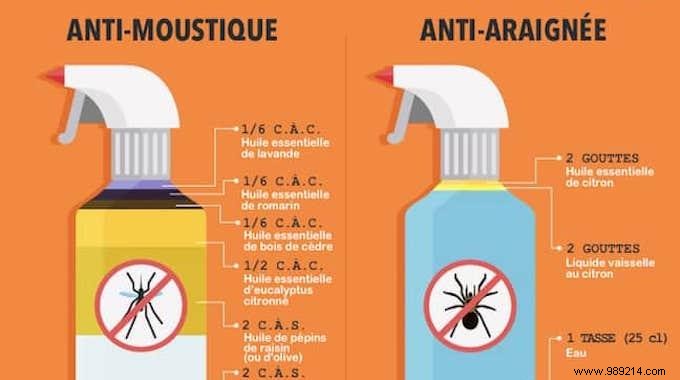
Ouch, ouch, ouch! Do you have ants in your sink?
Ticks in your socks?
Mosquitoes buzzing in your ear at night?
In the summer, everyone hates these insect infestations.
It's a constant struggle to avoid stings!
Luckily, here are 7 natural repellent recipes to get rid of these insects forever.
And this, without using chemicals harmful to health! Watch:

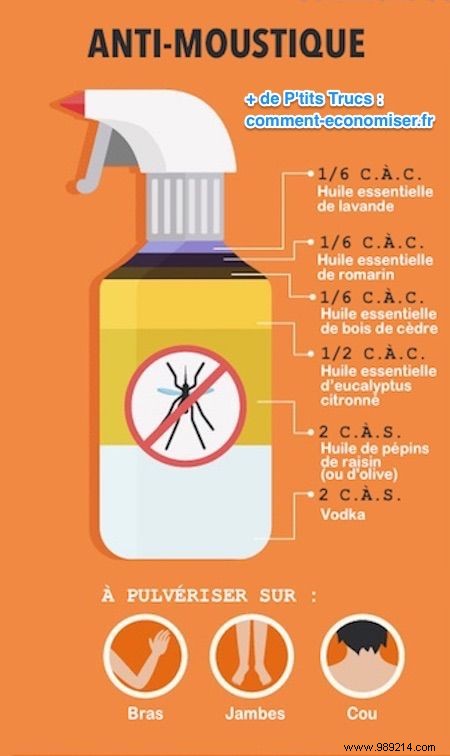
Ingredients
• 1/6 teaspoon of lavender essential oil (Lavandula angustifolia )
• 1/6 teaspoon rosemary essential oil
• 1/6 teaspoon of cedarwood essential oil
• 1/2 teaspoon lemon eucalyptus essential oil
• 2 tablespoons grapeseed oil (or olive oil)
• 2 tablespoons of vodka
How to
Spray the mosquito repellent on your arms, legs and neck.
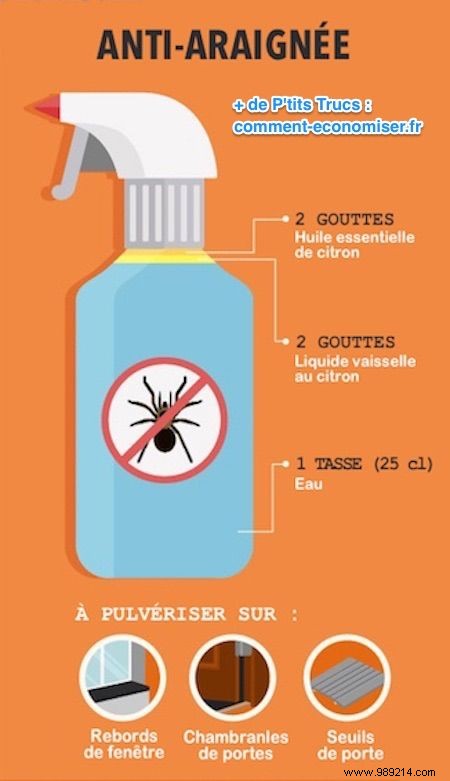
Ingredients
• 2 drops of lemon essential oil
• 2 drops of lemon washing-up liquid
• 1 cup (25 cl) of water
How to
Spray spider repellent on window sills, doorframes and door sills.
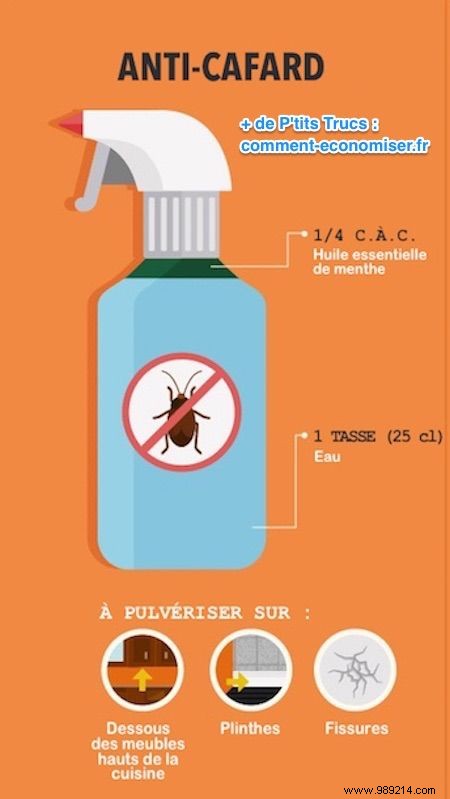
Ingredients
• 1/4 teaspoon mint essential oil
• 1 cup (25 cl) of water
How to
Spray the anti-cockroach under the kitchen cupboards, on the baseboards and in the cracks.
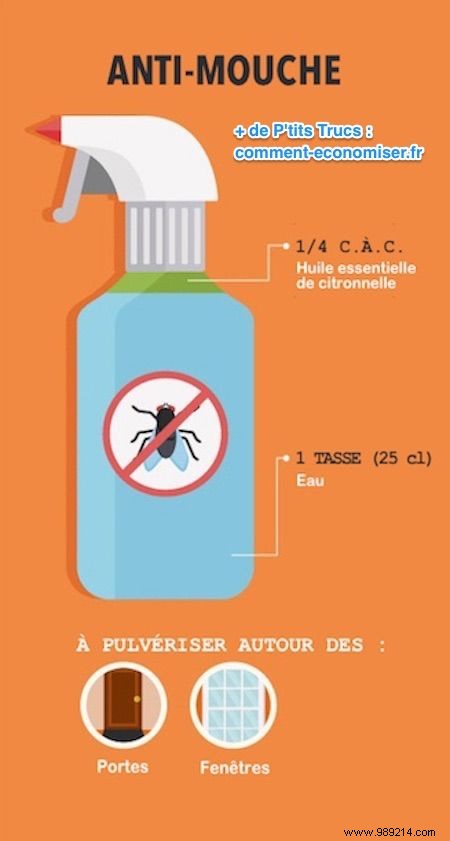
Ingredients
• 1/4 teaspoon lemongrass essential oil
• 1 cup (25 cl) of water
How to
Spray fly repellent around doors and windows.

Ingredients
• 1/4 teaspoon bourbon geranium essential oil
• 4 tablespoons of olive oil
How to
Apply the anti-tick on your arms, legs and neck.
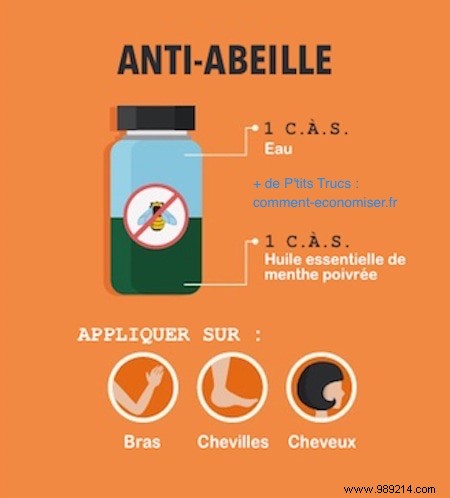
Ingredients
• 1 tablespoon of water
• 1 tablespoon of peppermint essential oil
How to
Apply Bee Repellent to your arms, ankles and hair.

Ingredients
• 1 tablespoon mint extract
• 4 tablespoons of olive oil
How to
Apply Ant Killer to window sills, door frames/thresholds and foundation cracks.
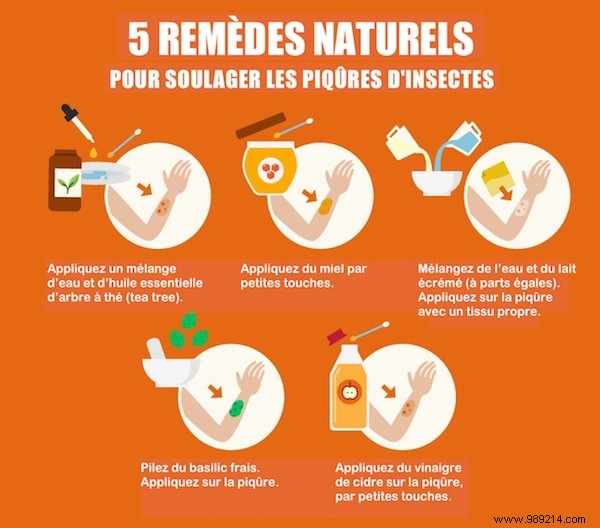
- Apply a mixture of water and tea tree essential oil.
- Apply honey in small dabs.
- Mix water and skimmed milk (in equal parts). Apply to the bite with a clean cloth.
- Crush fresh basil. Apply to the bite.
- Apply cider vinegar to the bite, in small dabs.
The most effective insect repellents on the market contain a chemical compound, N,N-Diethyl-3-methylbenzamide (DEET).
The problem is that this chemical has proven toxicity to the mammalian nervous system.
In rats, scientific studies have proven that DEET affects brain function, but also muscle control and coordination.
Thus, essential oils are a reliable alternative to DEET. In addition, most of the essential oils used in the recipes above are easily found online or in stores.
On the one hand, essential oils give off a pleasant fragrance.
But above all, essential oils are as effective as commercial repellents in repelling insects.
Except, of course, they don't contain any chemicals harmful to your family's health.
• Never use essential oil on children under 3 years old.
• Never apply essential oil to the eyes or mucous membranes.
• Never use essential oil during pregnancy without medical advice.
• Any essential oil and mixture containing essential oil is to be used exclusively for external use.
• Before using an essential oil for the first time, it is advisable to carry out an allergy test. For this, apply a drop of essential oil in the crease of the elbow before applying it to larger areas.
Essential oils are effective and natural, but this does not mean that they are not potentially dangerous to health.
Essential oils are produced by distillation and particularly concentrated.
Therefore, never ingest essential oils or apply them on or near the eyes.
Likewise, never use them on children.
Pregnant or breastfeeding women should always consult their doctor before using essential oils, even if it is a mixture that contains only a few drops.
To have a house without any insects, it may be necessary to take some additional measures (but always WITHOUT chemicals). For the most part, these measures are common sense:
1. Clean your floors and work surfaces regularly (broom/vacuum cleaner and mop). Regular cleanings are necessary because they erase the chemical trails deposited by insects, which they use to orient themselves to food sources.
2. In addition, try to seal the cracks in the foundation walls as well as the gaps under the windows and doors of your house. This method is particularly effective in barring access to unwanted insects, such as spiders and cockroaches.
3. Finally, take care to declutter the spaces that can serve as a refuge for spiders. Indeed, spiders love the dark corners of cluttered spaces, such as piles of wood and debris or bushy plants growing next to the house. The more you reduce the potential places where spiders can hide, the less you will have in your house.